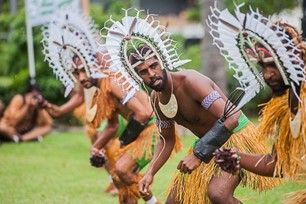THE VOICE OF RACIAL EXCLUSION
Torres Strait Islanders are racially described as Melanesian people. The inclusion of Torres Strait Islanders in the Voice highlights a serious racist/discriminatory problem with the proposed constitutional body.
Prime Minister Albanese visited Yorke Island in the Torres Straits in August 2022 to continue his push for the Voice where he met opposition from the Torres Strait Islanders who wanted their own separate “Voice from the Deep”. The model for the “Voice” was going to allocate 3 spaces on the Voice out of 23 to the TSI people – which means it was designed to be an Aboriginal Voice and TSI participation would be tokenistic. The embarrassing problem for Albanese, as in all politics, it really is everybody for themselves and this highlights the serious problem of creating special privileges based on race.
Torres Strait Islanders have historically not wanted to be grouped with the Aboriginal peoples, which is why they are listed separately and not collectively as Indigenous. However, they are referred to as First Peoples in the proposed referendum question.
Before Queensland annexed the islands in 1872, there were approximately 3,800 Melanesian people living there. By this time there was over 1.8 million people living in the British colonies that would become Australia. Our starting point should at the very least be that the TSI people are the third peoples.
Today, over 80,000 people in Australia identify as Torres Strait Islanders, a 20-fold increase, despite the islands’ inability to sustain more than 4,000 people for 2 thousand years before European contact. The arrival of the British missionaries is referred to as the coming of the light on the Torres Strait Islands and for those peoples alive today and the population explosion, the arrival of the British should be a matter of great celebration.
The Torres Strait Regional Authority governs the islands with an elected board comprising 20 representatives from the Torres Strait Islander and Aboriginal communities in the region, representing their interests at both the Commonwealth and State levels. This indicates that there is already an effective political structure and “Voice” in place for the islands.
95% of the TSI people do not live on the islands in the Torres Straits.
The Kanak indentured labor scheme, involving mostly Melanesian people, ended in the early 1900’s and over 2,500 Melanesian people legally remained and their descendants are referred to today as the South Sea Islander community. The descendants of these peoples, despite Melanesian descent like the people of the TSI, will not be granted the distinct rights and benefits enshrined in the Voice that is proposed only for TSI Melanesian Australians.
Fiji has a diverse population with both Melanesian and Polynesian ancestry. About 30,000 Australians identify as having Fijian heritage, but they have not been the beneficiaries of the economic advantages as the Torres Strait Islanders over the past 150 years. Despite their Melanesian roots, they will not be included in the separate rights and privileges enshrined in the Voice.
Over 200,000 Polynesian people have made Australia home and they come from a similar socio-economic position to the TSI Melanesians and yet there is No consideration of their needs and inclusion in the Voice.
The Voice is perversely designed to only include Melanesians of TSI descent and will not incorporate the Voice of any of the Australians with other Melanesian or Polynesian descent.
Another incredibly underprivileged group ignored is the “Karen” Burmese refugee population which is currently about 11,000 – people fleeing war arriving in Australia with virtually no possessions or wealth, unable to speak the language and building a new life are NOT considered worthy of the being in the Voice. The Karen people’s religion is Buddhist and animist – they are left to fund all activities themselves and battle to be heard.
This selective inclusion of certain segments of a race while excluding others is discriminatory and racist, and therefore, people must vote NO. Excluding races of similar socio-economic need to the extra rights and privileges of an enshrined Voice is discriminatory and racist and we must Vote NO.

